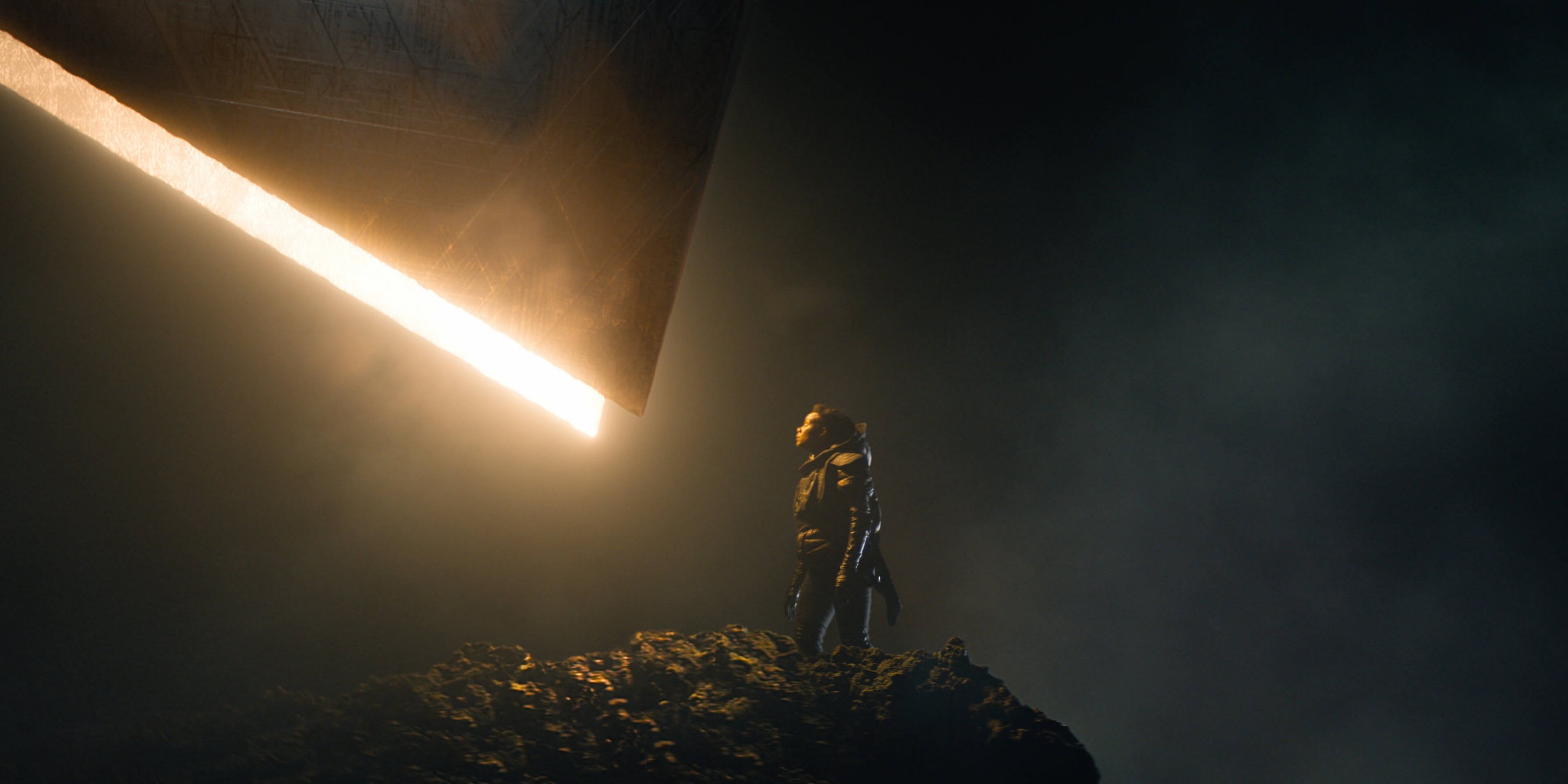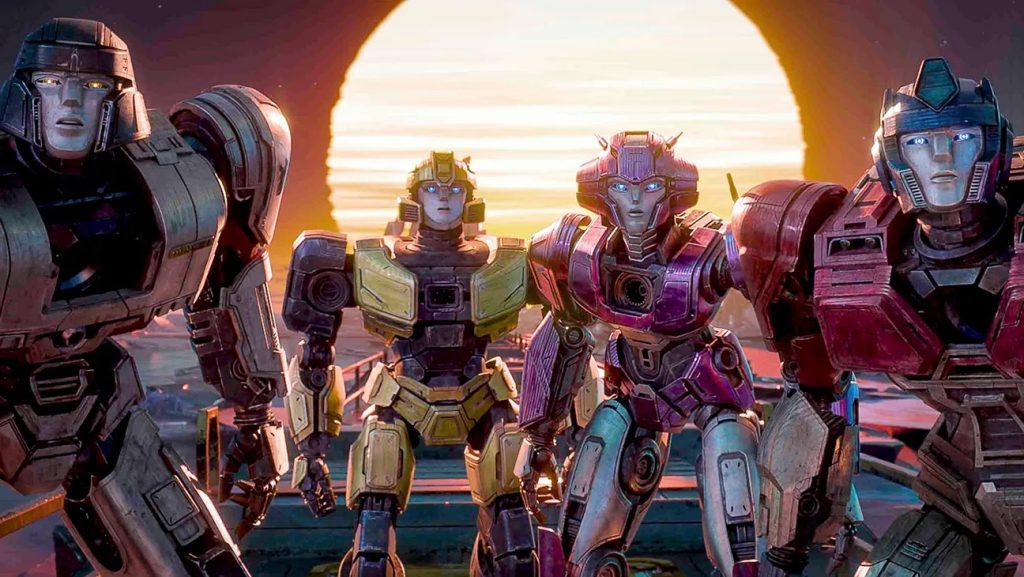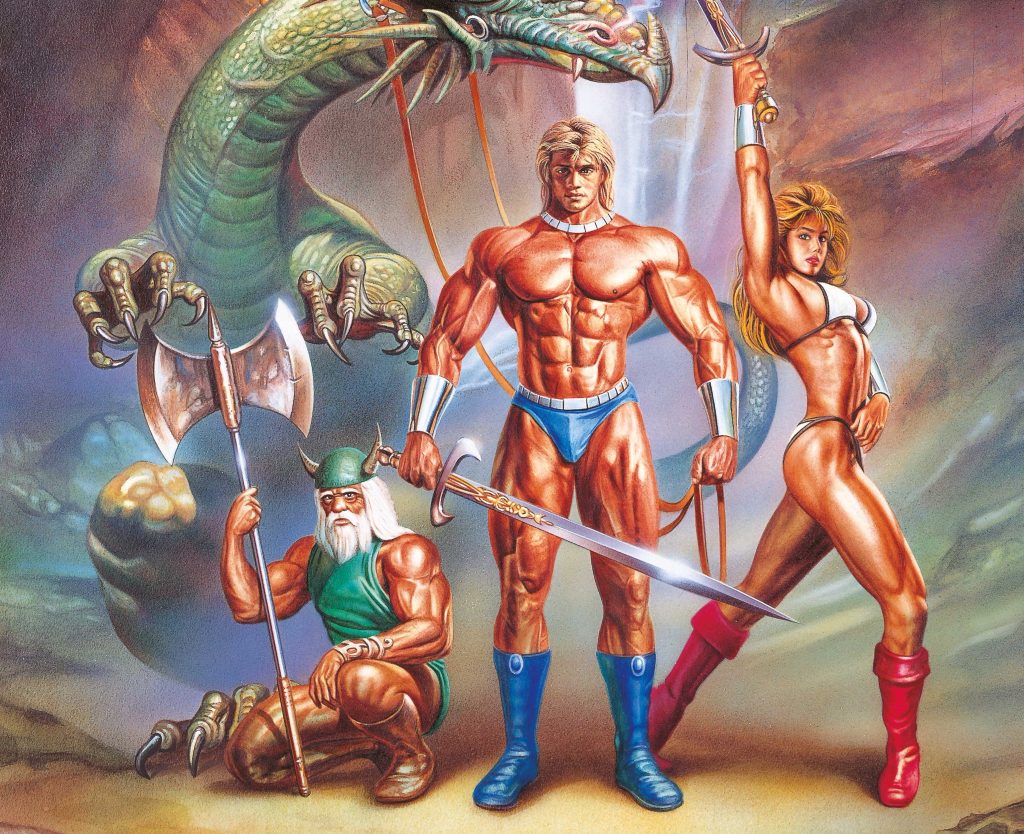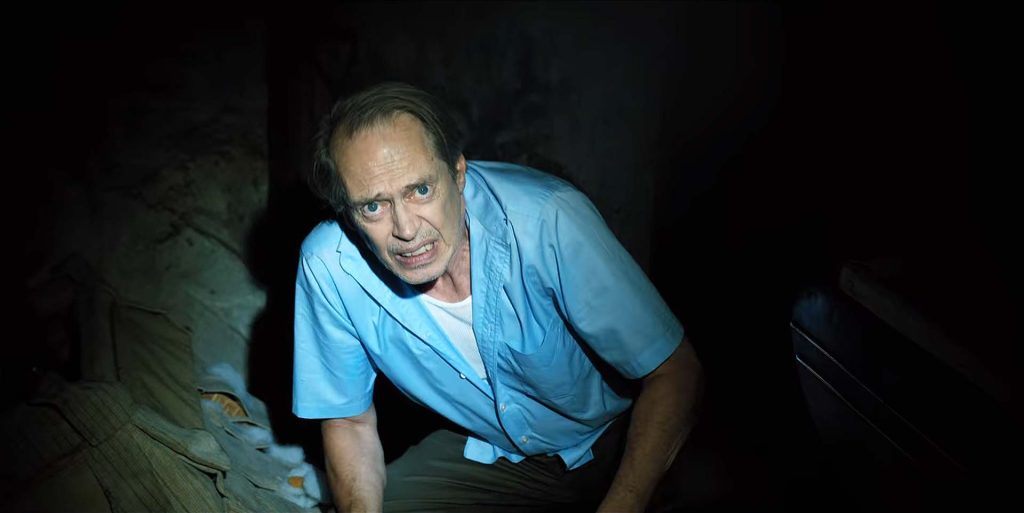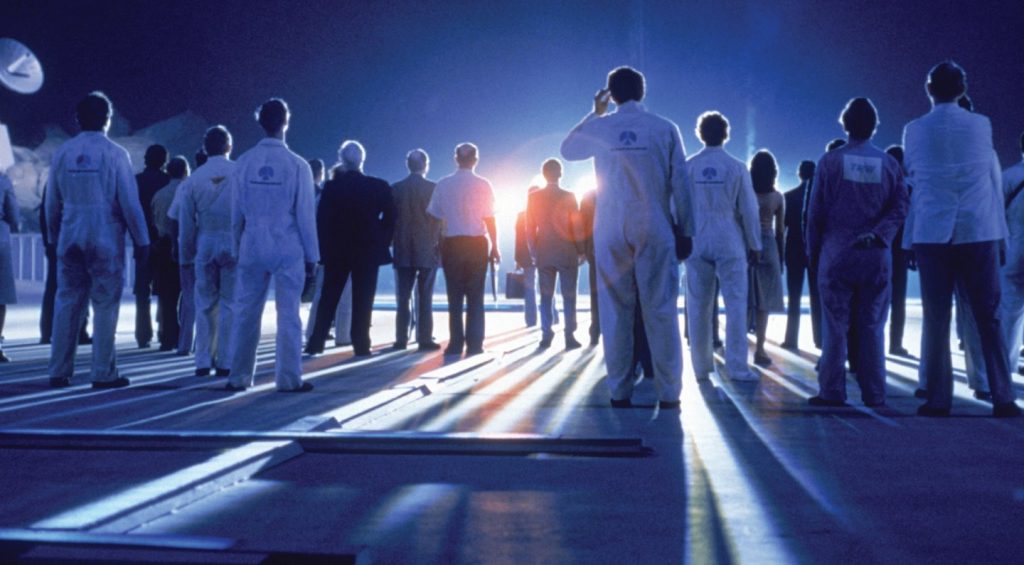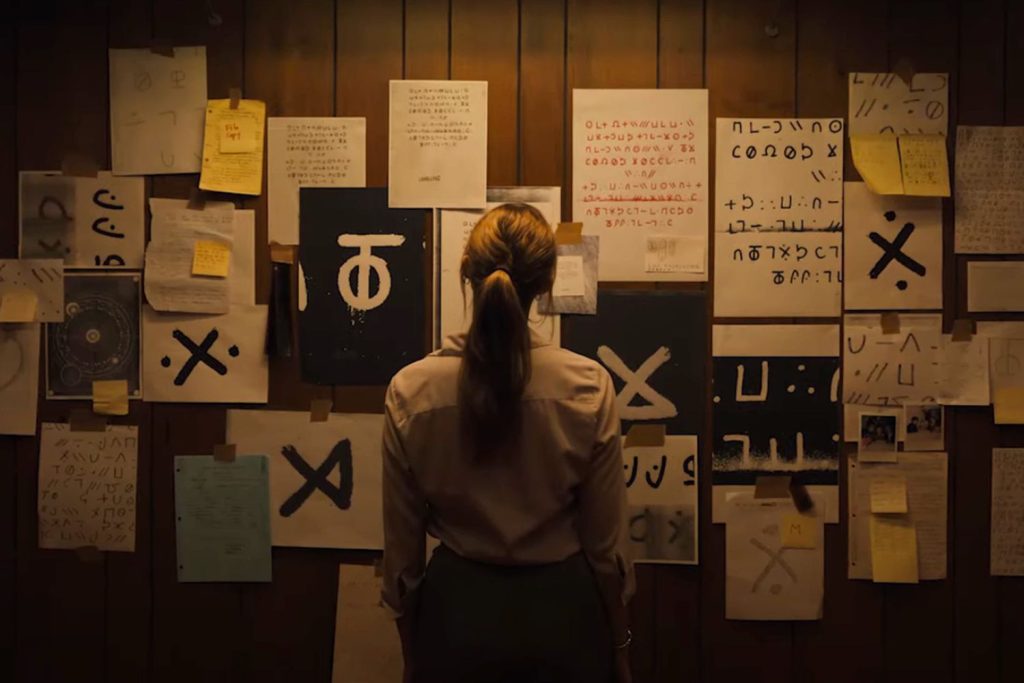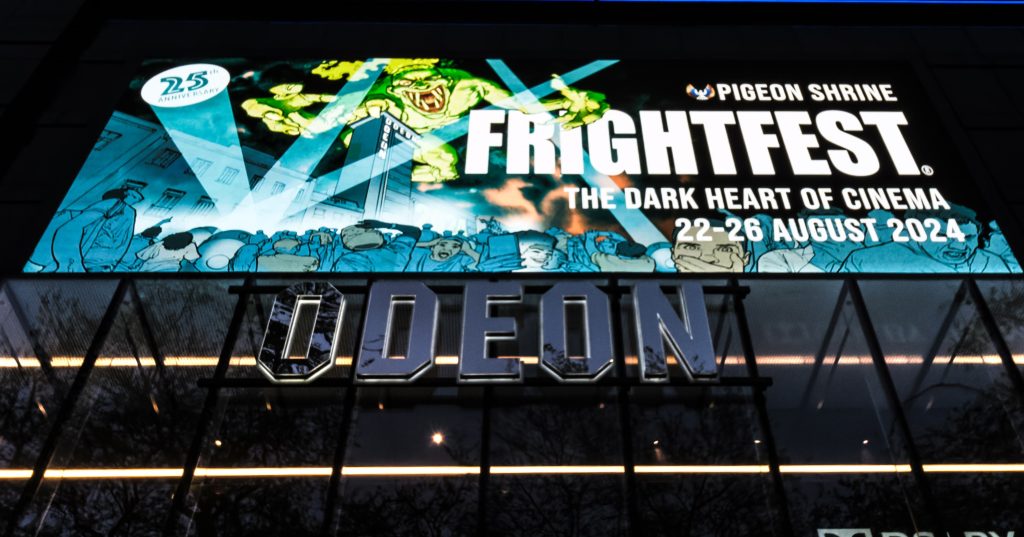David S. Goyer attempts a feat that has long been thought impossible: to adapt Isaac Asimov’s monumental Foundation series into a visual medium. The audacity of such a project should be enough to warrant praise but, almost unbelievably, Goyer pulls it off with an assured flourish.
The premise of Foundation is that, in the waning days of a future Galactic Empire, mathematician Hari Seldon develops a theory of psychohistory, a mathematical sociology. Using statistical laws of mass action, Seldon can essentially predict the future of civilisation. He foresees the imminent fall of the Empire, followed by a Dark Age lasting 30,000 years. Although the Empire’s fall cannot be stopped, Seldon suggests a plan by which “the onrushing mass of events must be deflected just a little” to eventually limit this Dark Age of humanity to a mere millennium. It involves the creation of the Foundations: two groups of scientists and engineers settled at opposite ends of the galaxy, whose mission it is to preserve the spirit of science and civilisation in a compendium of all human knowledge. These so-called Encyclopaedia Galactica would then become the cornerstones of a Second Galactic Empire.
From the breath-taking cinematography and the show’s unwavering loyalty to the spirit of the novels, to its top tier cast and agile writing spanning planets and generations, there’s as much to respect about Foundation as there is to love.
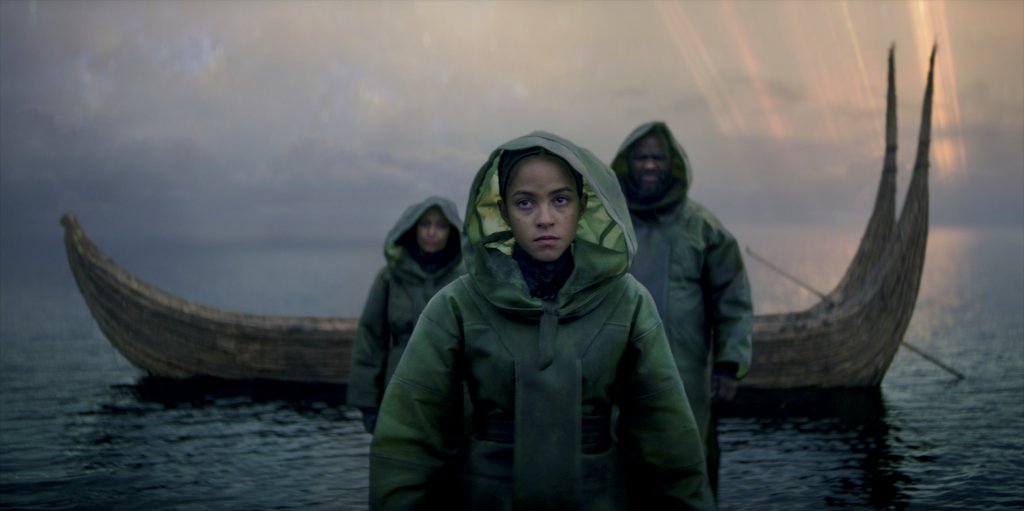
STARBURST had the pleasure to speak with the people who made the series possible: David S. Goyer, writer extraordinaire (you can thank him for the Blade trilogy, Christopher Nolan’s Dark Knight trilogy and Man of Steel, to name but a handful), Lee Pace (The Hobbit, Guardians of the Galaxy, The Fall) who plays the Emperor Brother Day, Jared Harris (Chernobyl, The Terror, Mad Men) as psychohistorian Hari Seldon, and relative newcomers Lou Llobell (Voyagers) and Leah Harvey, who bring to life Gaal Dornick and Salvor Hardin, respectively.
“Of course, there were sacred cows,” states Goyer. “I had to identify the core elements that make Foundation, the core characters, the themes; and I presented those to the Asimov estate to make sure we were on the same page.” Robyn Asimov, Isaac Asimov’s daughter, serves as executive producer on the show. “Any cursory reader of the books will understand that it could never be a line-for-line adaptation,” Goyer continues. “A lot of the books are about philosophy, about ideas, dialectics, and most of the action happens off-screen or in between sentences. And as this is a visual media medium, of course, we were going to dramatise those events.”
Expectedly, considering the novels’ stature in the science fiction canon, this isn’t the first time that studios have tried to adapt Foundation to film or television. Those who tried though, failed; Goyer’s series is the first time we will see Asimov’s epic saga adapted to the screen. “I think one of the differences between this attempt and prior attempts is that most of the prior attempts were movies,” the showrunner muses. “I myself was offered the opportunity to adapt Foundation twice before in my career, but I passed on it because I didn’t feel it could be condensed into two and a half hours, or even three films. Yet with the advent of these big, novelistic shows that we’re seeing on streaming, the medium and the audience have now evolved to a place where an adaptation of Foundation is possible.”
Jared Harris praises the ways in which Goyer balances Foundation’s grand ideas with its softer, character-driven moments. “It’s fantastically well structured and he’s dealing with some really big ideas; one on hand, something like the first scene can be as mundane as introducing a character and on the other, you have in mind these giant ideas and themes… those are fun things to play with.”
“The scale was always going to be big,” says Goyer. “It is intergalactic, but it’s also very intimate. For me the key was always grounding it in emotion. For every scene, whether we’re in the writers’ room or on set rehearsing, I wanted to make sure that if we strip away the spaceships, the robots, the nanotechnology, that the scenes still work as pure dramas.”
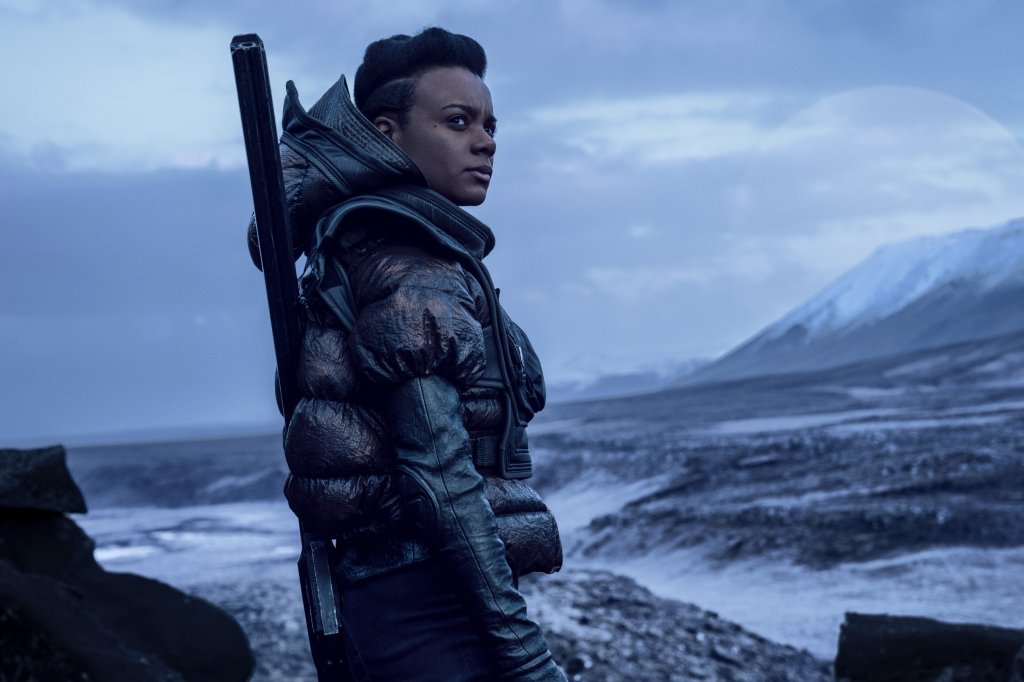
Even as Foundation stays loyal to Asimov’s story and ideas, adapting the tomes to television involved a number of narrative changes. For one, the inclusion of a wholly new character (or three): the Emperor Cleon, so little seen or discussed in the series, is here replaced with a genetic dynasty. Clones of the Emperor who rule as one individual for millennia and who call themselves Brothers Dawn, Day, and Dusk – played from youngest to oldest by Cooper Carter, Cassian Bilton, Lee Pace and Terrence Mann. Goyer explains that “because the show is so anthological, we needed to find a way for some of these characters to last over the course of 1000 years – and that’s what led me to the genetic dynasty.”
“In the books, Hari Seldon predicts the fall of the Empire,” he continues. “It’s an empire that’s existed on 10,000 worlds for over 10,000 years. They’re powerful, they’re resistant to change, they’re rigid. So, I tried to think, ‘What would be the purest expression of that theme?’ One man cloning himself over and over again and imposing his ego upon an entire galaxy. And that was a plot device that then led me to all sorts of wonderful character moments with the Cleon’s, because the show is also about legacy. They’re all desperate to individuate and to leave their mark on the galaxy, and the tragedy of them is that they’re all living in the shadow of Cleon the First. So even though they’re monsters, that plot device allowed us to tell stories that make it possible for the audience to empathise with them.”
Even the grandest themes can be made relatable when centred on complex, human characters. As Lee Pace says, “what I think is so interesting about this riddle posed about inherited power, is not the office of a God that [the Brothers] hold. It’s these individuals who are approaching it, and I think about it very much like how an actor approaches a role. I think, there’s Day looking at Dawn, who is the youngest of the dynasty, and Day is telling him: ‘These are the lines, this is the blocking, these are the costumes you’ll wear. It is imperative for the safety of the galaxy that you are exactly like me, that you believe what I believe, that you are an identical copy of me.’ And I believe Day looks at Dusk, the outgoing Emperor, and thinks, ‘You’ve made a lot of mistakes here. And now that I’ve got the power, I’m going to do it right. I’m going to be stronger, I’m going to be braver, I’m going to be distinguished among this line of clones.’ And that’s the contrary idea. When the fantasy is that they’re the same person. You see it in the first episode, when Hari Seldon delivers his mathematical certainty that the Empire will fall and all three of these Emperors respond in very different ways.”
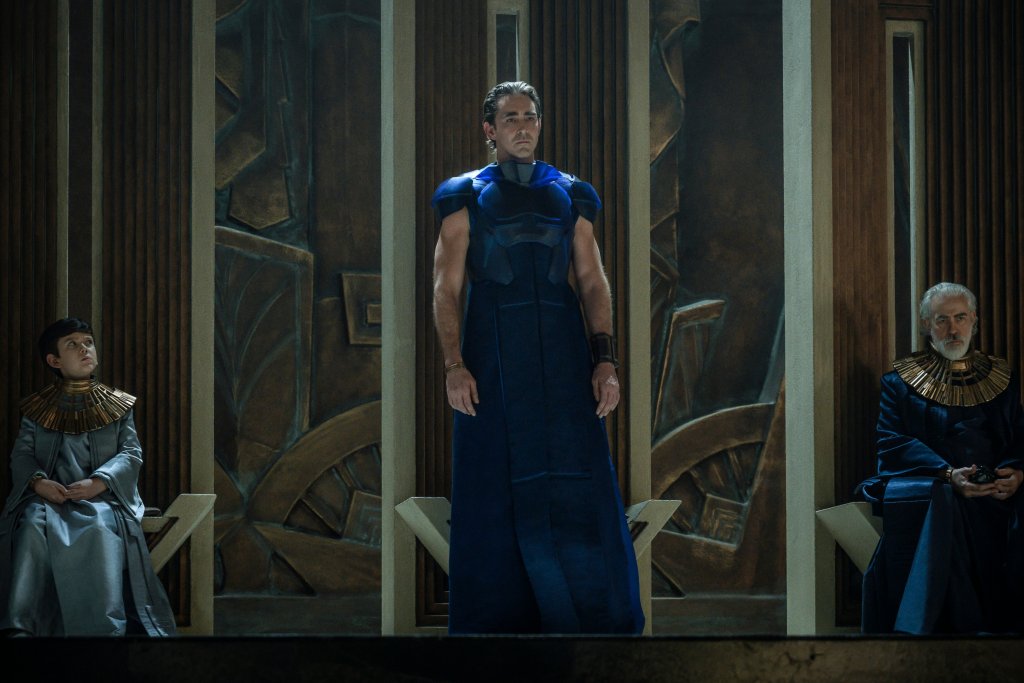
“What was hard was the idea of sharing a role with other actors and figuring out how we could find a commonality between us,” Pace continues. “We’d play this game where we would physically mirror each other, try to catch each other’s cadence, copy gestures, etc. But when it really becomes interesting is finding how these characters are different, because I believe what the story teases out is not only their individuality – and maybe these are the same thing – but their humanity. There’s an individual sentience that they start to discover. The fantasy is that they are a God that lives forever, that they are one person, when in fact they’re human beings who will live and die. It’s yet another riddle; this show is about everything and nothing. It’s about the biggest thing, and the smallest thing. It’s about what it means to be human, how do you react to change, how do you grapple with the power you hold?”
It’s all part of an unspoken mantra for Foundation: the key to the story is for viewers to feel for and relate to the characters, for those figures to be fallible and fragile. For example, one of the things Harris wanted to address was “how to avoid there being a reliance on using the character as a mouthpiece for his theory, or as an expositional device. I wanted to figure out a way to make the character seem human, seem real and fully fleshed, and have stakes in the moment. You’re playing a character who supposedly knows how everything will turn out. There’s nothing at stake for someone like that, so I discussed with David in great detail what Hari Seldon knew and what he didn’t. I was more interested in what he didn’t know, because that’s where the character is fallible and vulnerable.”
The other way in which the series updates Foundation is by changing the genders of some of its key characters. Asimov, despite being a master of speculative science fiction, still had a mostly all-male cast of characters, so for the show, Gaal and Salvor were written as women. When Leah Harvey was asked how this changed their approach to the character of Salvor (though they first auditioned for Gaal, Harvey revealed), they responded: “It’s interesting because I guess that being non-binary, I see gender as something that’s nothing and everything at the same time. I’ve had experiences playing characters in Shakespeare who are typically male, and my experience doing that is that it doesn’t really change anything. Playing a man or playing a woman, what does that even mean? In my mind, I’m playing a character who has a vision for themselves, has aspirations, fears, goals, has loves and hates. And that’s what character is.”
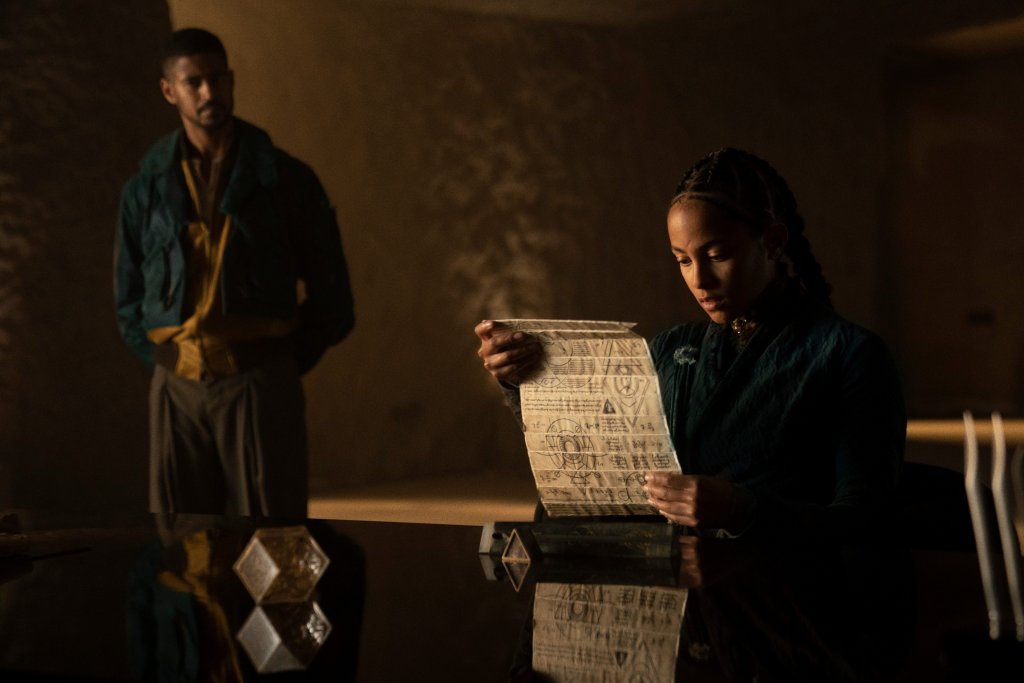
“The writers created this character who’s really three-dimensional, who has been pulled from the books and made modern, who has been made so that she represents people all over the world,” they continue. “And I get the opportunity to put that across in my own way. I’m excited for people to meet Salvor.”
Meanwhile, Gaal is the character through whom the audience discovers the world of Foundation. Acting as an anchor amidst the vertiginous world-building, Llobell explains that her character fulfils a similar role as many iconic fantasy heroes: “Harry in Harry Potter gets thrown into a world he knows nothing about, and then has to deal with everything that comes with it. Gaal has the same journey, Frodo from The Lord of the Rings is kind of the same. I didn’t particularly think about them when I created this character but, looking in hindsight, it’s pretty cool that Gaal is amongst these characters.”
“How often do you get a character who experiences so much, and really has to delve into seeing who she is, finding out who she is and discovering parts of herself that she probably had no idea existed?” Llobell questions. “She comes from a tiny rural planet on the outskirts of the galaxy and all of a sudden, gets thrown into the hustle and bustle of Trantor, and meeting Hari and all these new, fascinating people. She throws herself into it and she’s open to a lot, and is still hopeful about the future, which is such a joy to experience.” All this undoubtedly makes Gaal the perfect chronicler character, in the books as in the show. “She is thrown into this whirlwind of a story, and she goes with it because she believes in the math. The truth is what drives her… Ultimately, she’s driven and pretty amazing. She goes on such a huge journey, but it’s one that’s relatable.”
That hope Gaal sustains is crucial to buoying a story in which the collapse of civilisation is inevitable. “I think her ability to trust so easily is a strength of hers, but it also gets her heart broken so many times. Just like the amount of hope she has – it’s a good thing overall, but it’s also to her own detriment,” states Lloubell. According to Harris, Gaal and Hari Seldon have that in common. “I don’t see him as tragic,” the actor explains. “I see him as hopeful. I see him as somebody who’s prepared to make sacrifices to achieve his goal but, in the end, it’s a hopeful prospect because he perceived a way of surviving.”
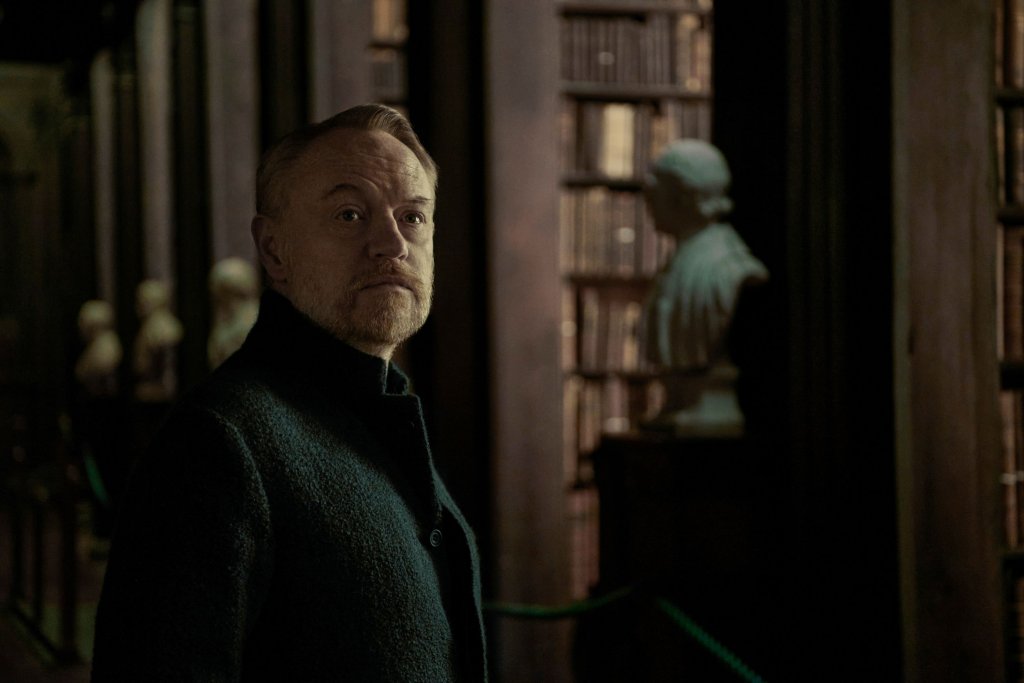
With science fiction so far removed from our reality, particularly for larger-than-life characters such as Hari Seldon and the Emperor, Harris and Lee Pace both found it important to source inspiration from real life. “I’m playing a series of men who, for a certain time in their lives, inherit the role of the Emperor of the galaxy,” says Pace. “Which is this absurd idea that one person could have control over the entire Milky Way Galaxy and have power of life and death over trillions of people, to control which planets prosper, which ones suffer. So, when approaching a character so absurdly abstract, I wanted to do some research to ground it – doing research is one of my favourite things that I get to do as an actor. Obviously, I looked at the Roman emperors that inspired Isaac Asimov to write this story, but I also looked at the Chinese dynasties, at the Incas for whom Emperors were basically Gods. I had a really great read of Kapuściński’s book “The Emperor” about the last emperor of Ethiopia, Haile Selassie. I found him particularly interesting.”
Harris, of course, is no stranger to bringing complex figures to the screen. “When you’re working on shows like Chernobyl or The Crown, you obviously have a historical record that you can access that can help you ground yourself in the reality of the story, and give you references to the character,” he explains. “With something like this, it’s a much more obviously imaginative process, but you still need references. To try to figure out Hari Seldon’s mindset, I went and did a lot of research into past scientists, men and women who made breakthrough discoveries. And the thing I realised was that on some level, they probably had huge egos and high opinions of themselves, but it’s also possible that they found their intellect isolating. There weren’t many people who could understand what they understood, which led me to understand what a rare thing Gaal represents for Hari: he finally has someone who understands him and can speak his language.”
Even something as seemingly outlandish as psychohistory, Harris found ways to tether it to reality: “One of the things I was considering when thinking of how to treat the proposition of psychohistory, and that made it very easy to accept, was what Cambridge Analytica have done. They’ve taken massive sets of data and crunched it, and they’ve been able to predict or manipulate the behaviour of individuals with it. That doesn’t seem to me like such a giant jump from what Hari Seldon was proposing.”
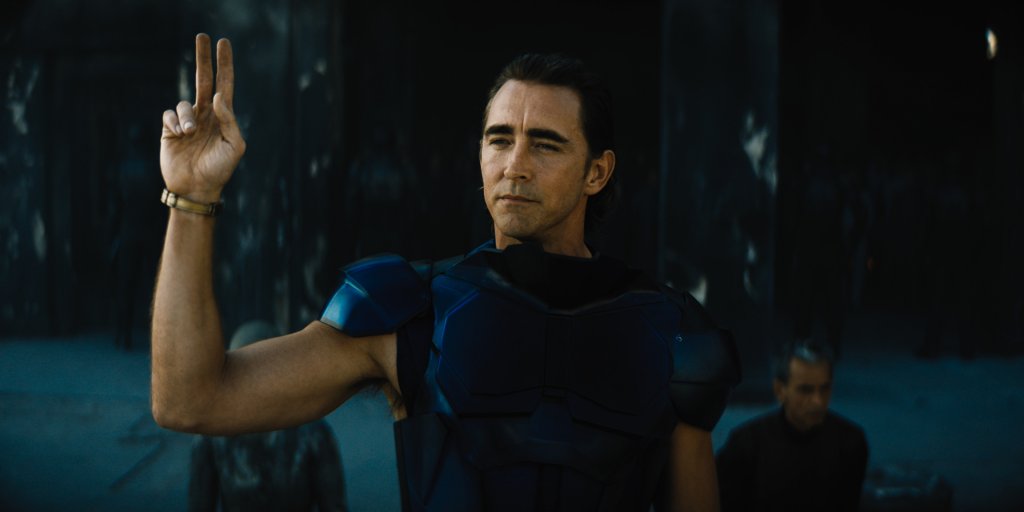
Beyond Foundation’s characters working as points of contact for the viewer though, there’s also a lot to explore and relate to thematically. As Pace sees it, “one of the opportunities you get with speculative fiction is that we can explore the experience of humanity outside the context of Earth in the 21st century. These are characters who are in the far, distant future on planets you couldn’t see even on the clearest night, and yet it’s about us. It’s about us right here and now. We examine what it means to be human, what the cycles are that we continually find ourselves in, our relationship to change and to power. What does math quantify? It can count the minutes, but can it record everything between those minutes, or does spirituality better answer those questions? What we’re attempting with Foundation is to open an investigation and bring the audience on the journey with us… I think this gives us the opportunity to engage in a discussion of our collective values without the triggers that put us in those circular discussions we always seem to find ourselves in, in the contemporary world.”
Harris’ view is perhaps more cynical. Speaking about Seldon, explains that “the character is another one in a long line of scientists who’ve made discoveries that were inconvenient to the power structure, and who would rather they shut up or disappear. That seems to be a familiar story in the human story. It’s depressing that this fact is a truism: that we continually ignore the advice of people who spend their life studying something, who are able to give us heads up. We make it very difficult for them to succeed, I guess because we’re afraid of the truth and would rather ignore it until it becomes impossible to ignore. It does feel like, as a race of people, we have this 11th hour habit where we wait until the last possible moment to do something.”
Still, even with the cyclical nature of histories, Goyer still believes there’s hope to be found. “The whole point of Foundation is that history repeats itself, that humanity is cyclical, and that a lot of the challenges that are confronting us now are not unique. They’re challenges that humanity has faced before. And so, I’d like to believe that we could learn from some of our past mistakes, and that was Asimov’s hope. I think the world could use a message like Foundation right now.”
Foundation begins streaming on Apple TV+ on September 24th. Read our review of the first two episodes.

